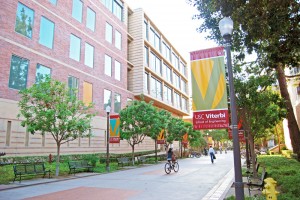Viterbi drops three places in graduate school rankings
The USC Viterbi School of Engineering’s graduate program fell from seventh to 10th on this year’s U.S. News & World Report Best Engineering Schools list after the administrating body corrected a reporting error that was largely responsible for the school’s high rank last year.

Pitfalls · USC’s Viterbi School of Engineering dropped three places in the U.S. News Rankings after correcting last year’s reporting error. - Daily Trojan file photo
Viterbi ranked seventh last year, but in June Inside Higher Ed reported that Viterbi had inaccurately listed the number of faculty members who are part of the National Academy of Engineering, a high distinction in the field. U.S. News uses the percentage of NAE members on a school’s faculty as a criterion for ranking.
Because of what administrators said was an honest mistake, Viterbi reported the total number of NAE faculty members, not just full-time, tenure-track professors as the U.S. News survey stipulates.
This year, better attention was paid to the numbers reported, and Viterbi fell three places in the rankings.
“In the rankings that were published a year ago, the USC Viterbi School said they had 18.3 percent of faculty with NAE membership for the 2008 year,” said Robert Morse, Director of Data Research for U.S. News & World Report. “For the 2009 year, they said it was 8.9 percent. That was more or less the main reason why the school fell from seventh to tenth place.”
According to Leslie DaCruz, executive director of communications and marketing for Viterbi, the school, in response to U.S. News’s request, reported the number of tenured faculty with NAE membership for the 2010 rankings.
“Basically, we went to a stricter way of reporting and we knew it was going to affect our ranking in some way,” DaCruz said. “Being ranked 10 this year keeps us in great company.”
In addition to the change in the number of NAE faculty reported, the drop in rankings was also influenced by a combination of other factors, including the performance of other schools in the 10 metrics used for the calculations. Because schools submit new information for the rankings every year, there is always movement up and down.
For students considering graduate programs in engineering, rankings can factor into the decision.
Xiaoran Wang, a graduate student from China studying electrical engineering, said she looked at rankings over a period of years for the graduate programs she considered applying to and also considered admission rates, cost and location. The most important factor she considered, however, was the academic reputation of the school and the program she wanted to study.
“I think ranking was a very important factor when I chose a graduate school, [but] I think reputation was the most important because people in China prefer to go to high reputation schools; and reputation will help you find a job and get into doctorate programs,” Wang said.
Wang also added that USC’s drop on the list is not significant to her.
“I don’t think a change of three or four places is a huge drop. Ranks rise and fall, and [the drop] is not that important,” she said.
DaCruz said that the school is not concerned by the drop because of the natural fluctuation in rankings it has experienced over the years.
“Over the last 10 years, Viterbi has been from No. 12 to No. seven,” DaCruz said.“The rankings are one of many different measures and they really change. The important thing is the quality of education people get, and that’s the reason why they choose to come here.”
U.S. News & World Report surveyed 198 graduate programs in the country to get information used for the rankings. It calculated the rankings based on 10 criteria, including research expenditures, number of Ph.D. graduates, enrollment and graduate record examination scores.
